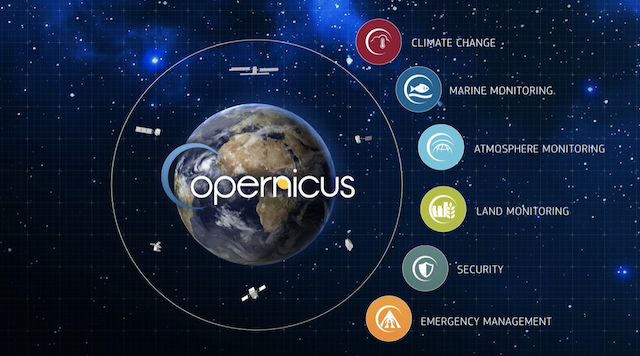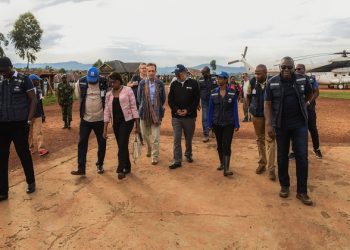by Jonathan Tirone, Bloomberg
Climate change is picking up pace in Europe, thrusting farmers and power generators onto the front lines of a battle with nature that threatens to upend the lives of the half billion people who occupy the world’s biggest trading bloc.
Last year was the third hottest on record and underlines “the clear warming trend” experienced in the last four decades, according to the Copernicus Climate Change Service, which operates a network of satellites for the European Union that collects weather, soil, air and water data.
Copernicus lenses captured dozens of images illustrating how climate change is unfolding on Europe’s landscape. The images were made available to coincide with a gathering of 15,000 scientists in Vienna at an annual meeting of the European Geosciences Union, which assesses the issue each year.
The convention in the Austrian capital is a locus of discovery, where scientists present research and compare notes. The European Space Agency, which operates the Copernicus network, is boosting its 2019 presence after it developing a series of open-source data tools designed to help economies adapt to the hotter and drier seasons already impacting crop yields, power generation and river transport.
Rainfall across central and northern Europe was 80 percent below average levels, resulting in agricultural losses and wildfires. Satellite photos showed dozens of Swedish forests burning in July that destroyed more than $100 million worth of woodland.
“As temperatures rose during the year, so did the duration of sunshine,” Copernicus said in a statement. “Parts of central and northern Europe experienced up to 40 percent more sunshine hours than average with Germany being the sunniest on record.”
Not all of the impacts are negative. The preponderance of cloudless days in northern Europe helped Germans generate a record amount of solar power last year. Their 45 gigawatts of installed capacity provided Europe’s biggest economy with some 9 percent of its electricity while forcing utilities to integrate more variable flows of power from renewables onto their grids.
But that sunshine took a toll on another source of European power—hydroelectricity. Alpine glaciers, whose melting waters help top off hydro power plants across Austria and Switzerland, are disappearing at a faster pace.
“Glacier retreat would have a large impact on the Alps since glaciers are an important part of the region’s ecosystem, landscape and economy,” said Harry Zekollari, a climate scientist in Switzerland. “They attract tourists to the mountain ranges and act as natural fresh water reservoirs. Glaciers provide a source of water for hydroelectricity, which is especially important in warm and dry periods.”
It’s because of those long-term weather trends that that the EU is trying to get more policy makers and businesses to use satellite data and imagery to help planning. Its data feeds Barcelona’s Vortex SL, which aids renewable energy developers to find places with the best wind currents and weather patterns before installing turbines and panels. Marex Spectron Group Ltd. use Copernicus data in forecasting coffee, sugar and cocoa yields. The EU project said it even helped Heineken NV brew a better beer by lowering the amount of water it needs in the process.
The pain felt by European farmers was evident from space, according to Copernicus, which published images showing how the normally lush cropland of central and northern Europe were burnt crisp by heat and lack of rain.
“Dry conditions were especially persistent in Germany, where the April-September period was the second-driest on record, leading to heavy agricultural production losses,” the scientists wrote.
In order to avoid the catastrophic effects of runaway climate change—rising seas, super-storms, famine and war—the world needs to invest some $2.4 trillion a year through 2035 in order to cut fossil fuel emissions. Even a rise of 1.5 degrees would have massive consequences, including a “multi-meter rise in sea levels” over hundreds to thousands of years and a mass extinction of plants and animals.
To avoid the worst outcomes posed by living on a hotter and drier planet, Copernicus is trying to help farmers by giving them access to satellite images overlaid with data, which could help agriculture identify crop strains that can keep up with the changing climate.
Countries need to “develop and consolidate innovative approaches, tools and methods for characterizing high-impact events and quantify loss and damage,” according to the World Meteorological Organization’s state of the climate report.





